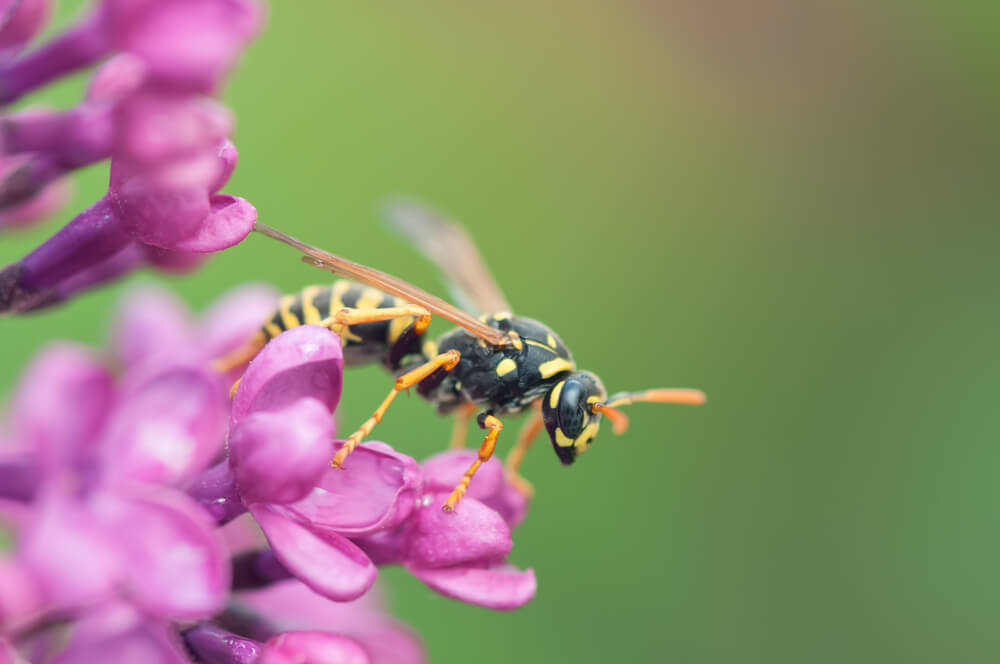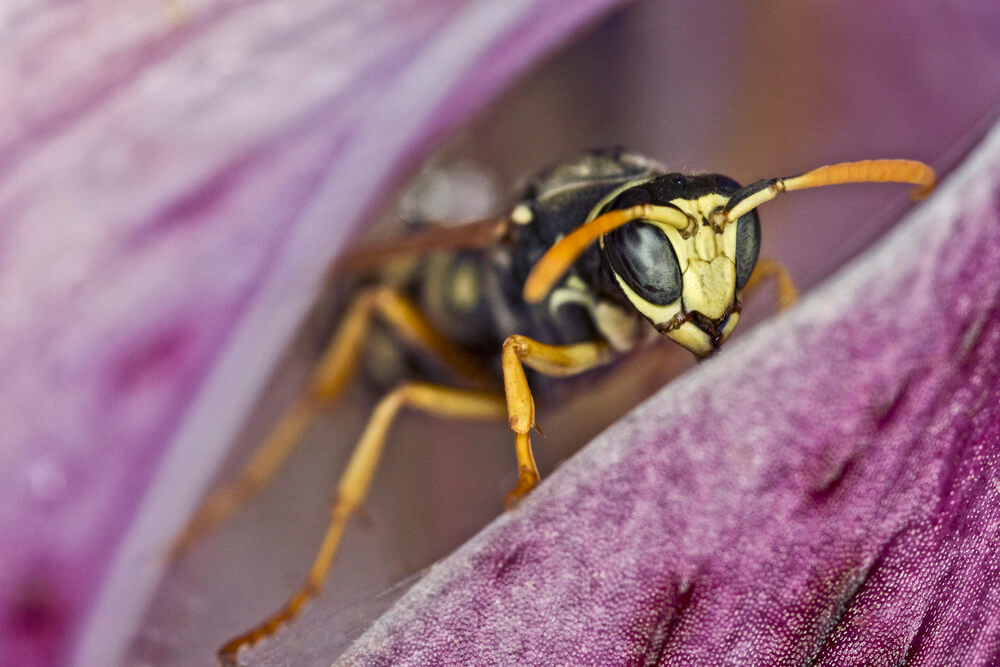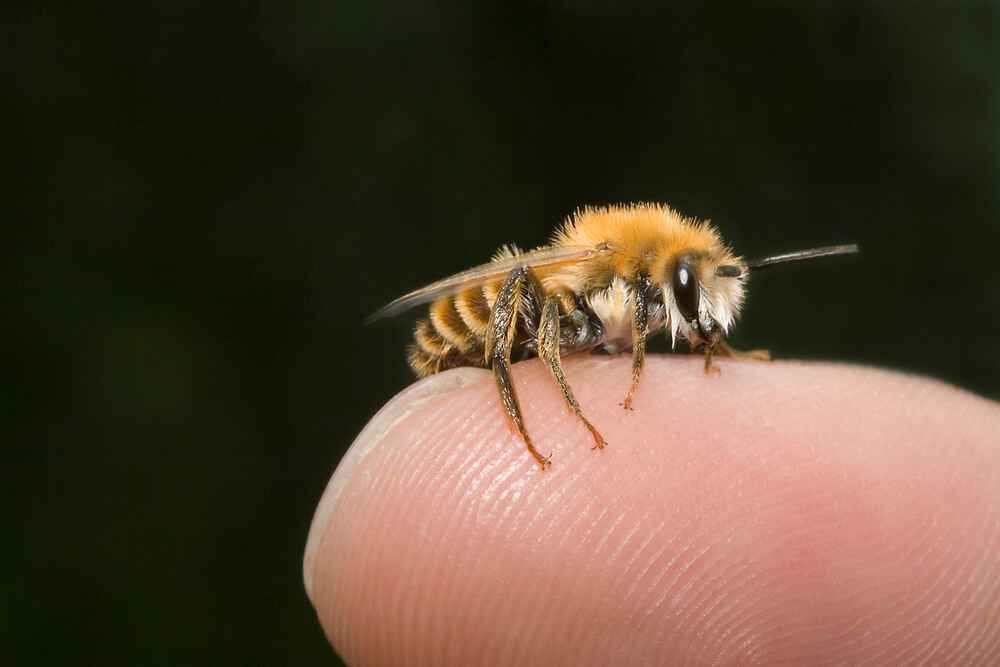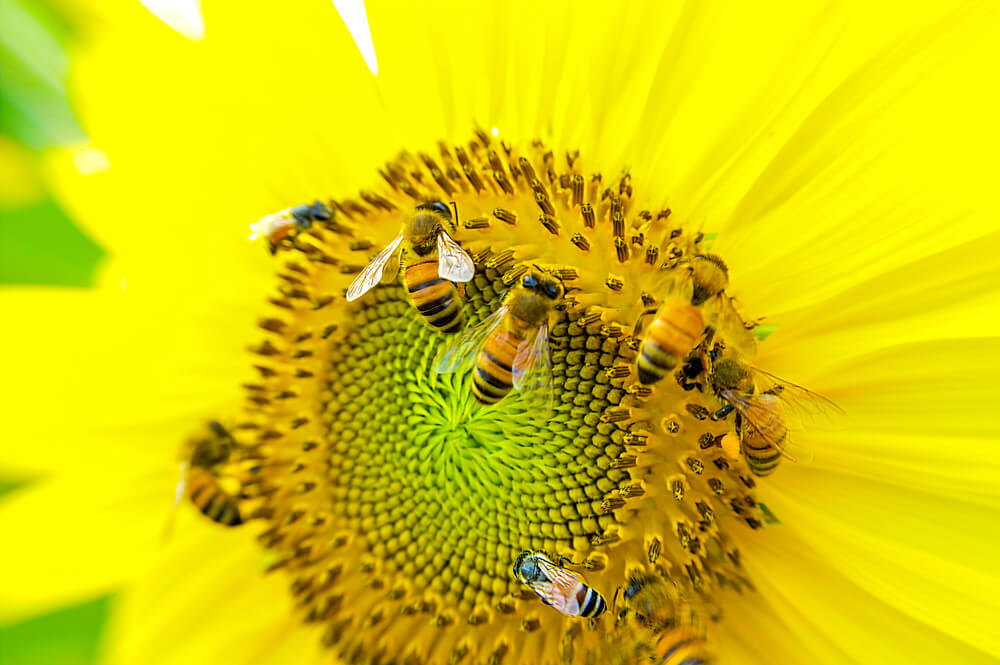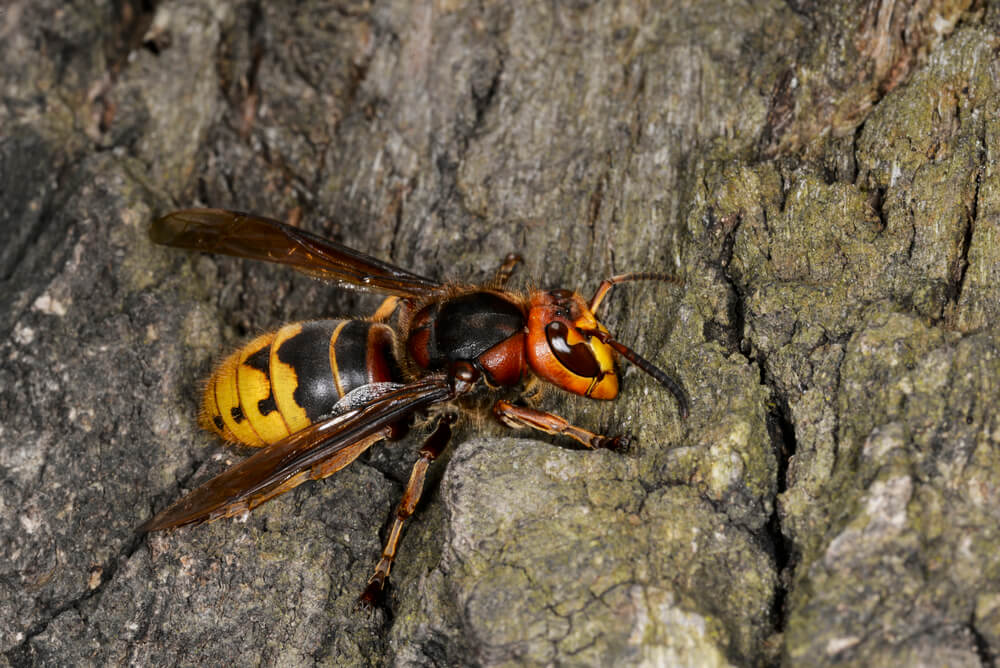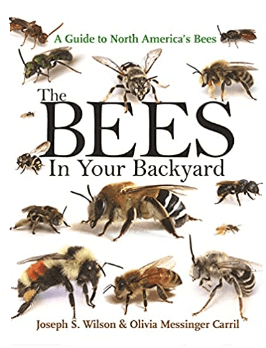Table of Contents:
How Long Do Wasps Live?
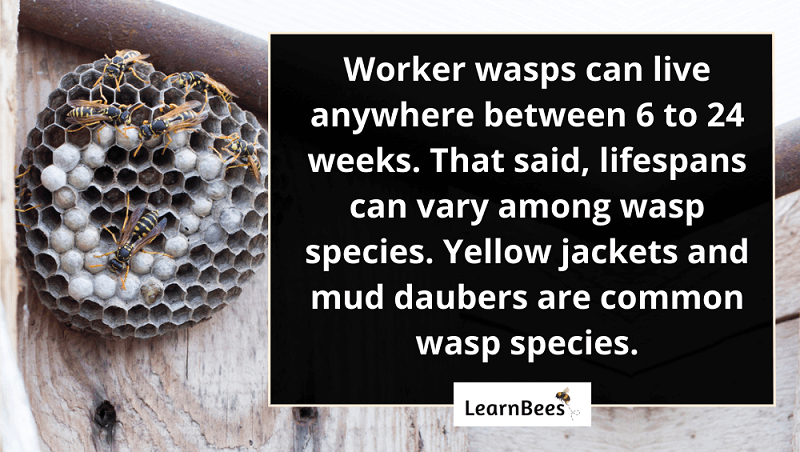
Worker wasps typically live anywhere between 6 to 24 weeks.
But keep in mind:
There are more than 30,000 species of wasps worldwide.
Yellow jackets, paper wasps, and mud daubers are all common species you may see flying around your home. The average lifespan can vary among species. For example, yellow jackets are estimated to have shorter lifespans than mud daubers.
And here’s the thing:
Wasps aren’t as widely researched as bees, so we don’t have tons of data on their average lifespans. Instead, we have estimates.
With that in mind, let’s consider the estimated lifespans of some common wasp species:
Yellow Jacket Lifespan:
- Queen yellow jacket: 10-12 months
- Worker yellow jacket (female): 6-24 weeks
- Drone yellow jacket (male): 4 weeks
Mud Dauber Lifespan:
- Female mud dauber: 10-12 months
- Male mud dauber: 4 weeks
Paper Wasp Lifespan:
- Queen paper wasp: 10-12 months
- Worker paper wasp (female): 12-16 weeks
- Drone paper wasp (male): 4 weeks
These lifespan numbers are averages. They can vary depending on the climate, food supply, and general living conditions.
For instance, wasps that live in warm climates can remain active throughout the year. It’s not unusual to see wasps active year-round in temperate climates like Florida or California.
But in colder climates, however?
Wasps tend to die off by the fall, leaving only the queen behind to hibernate until spring.
How Long Do Wasps Live Without Food?
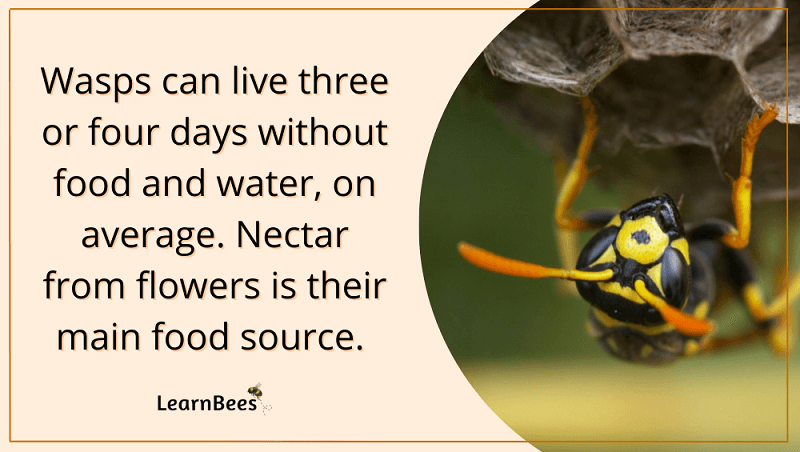
On average, wasps can live three or four days without food.
Wasps are omnivorous creatures that feed from plants and eat other insects. Adult wasps eat nectar from flowers, honeydew, and the sugary liquids produced by fruit.
Wasp larvae eat insects that the adult wasps have hunted and brought back to the nest. In turn, wasps help keep pest populations under control.
Think about it like this:
Without wasps, our food crops would be overrun with pests like cabbage worms, aphids, and beetle larvae.
Furthermore, wasps play an essential role in our ecosystem thanks to their pollination services. In fact, there are over 150 plants that rely on wasps for pollination.
Like bees, wasps are one of humanity’s most ecologically important creatures. They pollinate our crops and flowers, and also eat crop pests and insects that carry human diseases.
How Long Do Wasps Live Indoors?
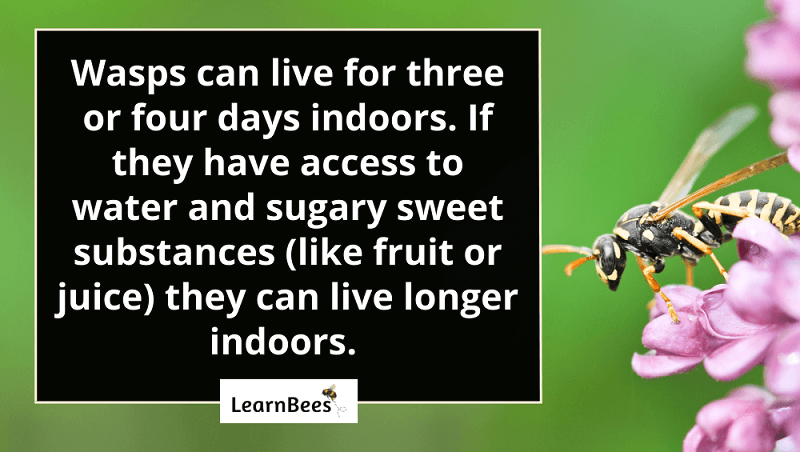
Wasps typically survive no more than three or four days indoors without a food source. They can live longer if they can access sugar sources like fruit and juice.
It’s important to note that wasps are more likely to be attracted around your home if you have open food sources available. So it’s best to keep lids on trash cans and close up any containers of sugary liquids if you’re eating outside.
When indoors, wasps hang out on the ceiling near lights and corners. If you see a wasp indoors, it’s important to take safety precautions before removing it.
Wasps can become defensive if they feel threatened, so it’s best to put them outside so they aren’t near children or pets.
You can remove a wasp from indoors by placing a cup over it and sliding a piece of paper underneath the cup. Then, carefully walk outside and release the wasp where it can find food and shelter.
At the end of the day, wasps have an important role in our environment, so it’s best to avoid killing them.
By understanding their lifespans and behaviors, you can better protect yourself and your home while still respecting these vital insects.
FAQs on “How Long Do Wasps Live?”
- How long do queen wasps live?
- How long does a paper wasp live?
- How long do wasps live in the house?
- How long can a wasp survive without a nest?
- Do wasps die naturally?
- Do wasps die in the winter?
- Will wasps come back if you destroy their nest?
- What temperature kills wasps?
- Do wasps die after they sting you once?
- What month do wasps die?
- Does killing a wasp attract more?
How long do queen wasps live?
Queen wasps can live up to one year, depending on the species. Remember, there are more than 30,000 wasp species so lifespans can vary greatly.
Additionally, wasp lifespans can be affected by local conditions such as weather and food supply. For instance, warm climates allow wasps to live longer and remain active in the fall and even winter. South Florida, for example, experiences mild winters that allow wasps to collect nectar from flowers year-round.
Colder climates, such as Vermont, experience harsher winters that put most plants into dormancy. As such, wasps die off as food sources become scarce and the first frost hits.
—> Go back to the FAQs on “How Long Do Wasps Live?”
More to Explore:
- Do Wasps Make Honey?
- What’s the Difference Between Wasps, Hornets, and Bees?
- Wasp Nest vs. Bee Nest: Which One Is It?
How long does a paper wasp live?
Paper wasps live anywhere from one month to one year, depending on their role in the colony.
Paper wasps are social wasps that live in colonies with queens, workers, and drones. The queen paper wasp is the longest-living member of the nest and can live up to one year while laying eggs. The queen paper wasps’ most important job is to lay plenty of eggs to ensure the future generation of paper wasps.
Female worker wasps typically live 12 to 16 weeks. The worker wasps’ duties include collecting food, building and maintaining the nest, and caring for the queen’s eggs. They’re also tasked with protecting the nest from intruders.
Here’s the interesting part:
Only female wasps and bees have stingers. Males do not, so they cannot protect the nest.
Male paper wasps have one job, and that’s to mate with queen paper wasps from other colonies. They die soon after mating, usually only living a few weeks in total.
—> Go back to the FAQs on “How Long Do Wasps Live?”
More to Explore:
- Wasps vs. Honey Bees: Are They Different?
- Are Worker Bees Male or Female?
- Do Yellowjackets Sting or Bite?
How long do wasps live in the house?
Wasps usually only survive three or four days inside the house. They can’t find adequate food sources, and they also need water to stay hydrated.
Removing the wasp from your home as soon as possible is best. You can use a cup or glass and a piece of paper to capture it gently. Then, walk outside and release the wasp away from your home’s entrance.
If you’re noticing several wasps getting trapped inside your home, then you may have cracks or crevices in your walls or windows that the wasps are using to enter. Check for potential entry points and seal them with caulk to prevent future invasions.
—> Go back to the FAQs on “How Long Do Wasps Live?”
More to Explore:
- What Are Black and Yellow Wasps?
- Do Hornets Pollinate?
- How Do You Get Rid of a Yellowjacket Ground Nest?
How long can a wasp survive without a nest? How long do wasps live without a nest?
Social wasps live in nests with other wasps. They rarely get separated from their nests, considering they have internal senses that allow them to find their way home.
If a wasp gets separated from its nest, like, it gets trapped inside a home, then it usually lives no more than three or four days. Without the support of other wasps, food sources, and shelter, the social wasp couldn’t survive without its colony.
—> Go back to the FAQs on “How Long Do Wasps Live?”
More to Explore:
Do wasps die naturally?
Wasps die naturally all the time. Natural causes of death include old age or frost. Older wasps look slightly worn out, with tattered wings due to regular flying and foraging for food.
When winter approaches, wasps often die due to cold temperatures. Wasps are not equipped with the necessary fur or feathers to survive frosty weather and will die if temperatures drop too low. As such, most wasp species die off during the fall months.
In the meantime, the queen wasps will hibernate in burrows and wait for the warmer weather to return. When temperatures rise, they will emerge from their hiding spots and begin to rebuild their colonies.
Knowing how long wasps live can help us better understand these important pollinators and appreciate them in nature. It’s also useful when removing unwanted wasp nests around your home.
—> Go back to the FAQs on “How Long Do Wasps Live?”
More to Explore:
Do wasps die in the winter?
Wasps die in the winter due to cold temperatures and lack of food sources. As the temperature drops, the wasp colony will start dying off – leaving only the queens to survive. The queens will find shelter in burrows and wait for warmer weather to return before rebuilding their colonies.
The queen wasps have already mated and are loaded with enough sperm to start new colonies in the spring.
But as mentioned, wasps can live longer in warmer climates that don’t experience harsh winters. Southern California is an example of a climate where the weather remains warm year-round, allowing flowers to bloom and insects to stay active.
—> Go back to the FAQs on “How Long Do Wasps Live?”
More to Explore:
Will wasps come back if you destroy their nest?
Wasps will usually find another place to go if you knock down their nests. However, wasps are valuable pollinators that should be left alone in most cases. For example, mud daubers and paper wasps are gentle creatures that don’t attack people out of the blue.
Mud daubers and paper wasps nest under porch eaves or carports. If you find one of these nests, then it’s best to leave them alone.
You can safely knock the nest down once late fall or winter approaches. The wasps will abandon their nests once cold weather hits. The female wasps will then go into hibernation somewhere safe until she emerges again in the spring.
—> Go back to the FAQs on “How Long Do Wasps Live?”
More to Explore:
What temperature kills wasps?
Wasps typically die once the first frost hits. The first frost varies depending on the local climate, with some areas having them as early as September and others as late as December.
—> Go back to the FAQs on “How Long Do Wasps Live?”
More to Explore:
Do wasps die after they sting you once?
Unlike honey bees, wasps don’t die after stinging. Wasps have a smooth, spear-like stinger that they can use multiple times. In contrast, honey bees have hooks in their stingers that get lodged inside human skin. Once the honey bee flies away, its stinger gets pulled out, which ultimately kills the bee.
Fortunately, wasps and bees don’t usually sting humans unless provoked or threatened. To avoid getting stung by a wasp, maintain a safe distance away from their nest.
—> Go back to the FAQs on “How Long Do Wasps Live?”
More to Explore:
What month do wasps die?
Wasps start dying off once the first frost hits. The first frost can hit anywhere between September and December, depending on where you live. A frost occurs when temperatures drop below freezing and plants start going dormant. Wasps cannot survive these conditions and will die off and leave only the queens behind to hibernate until spring.
To summarize, wasps die naturally due to age, cold temperatures, or lack of food.
—> Go back to the FAQs on “How Long Do Wasps Live?”
More to Explore:
Does killing a wasp attract more?
Killing a wasp doesn’t necessarily attract more wasps because not all wasps are social creatures. However, if you kill a social wasp like a yellow jacket, then you’re more likely to attract the attention of the colony who senses danger.
With that in mind, you should avoid killing wasps because they’re a valuable part of nature’s ecosystem. If you have unwanted wasps around your home, then it’s best to wait until winter to knock down their abandoned nests.
